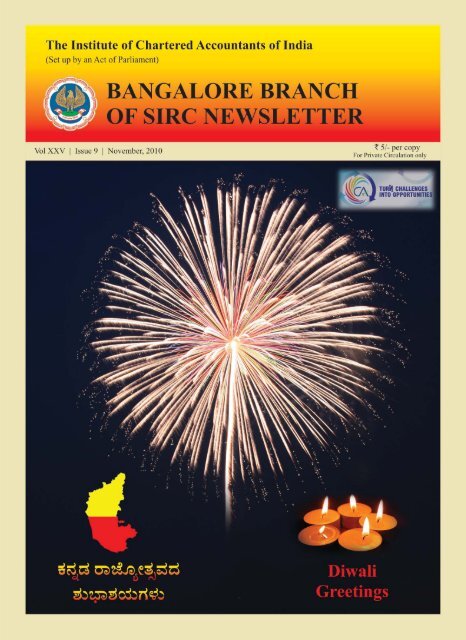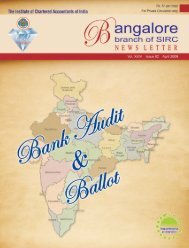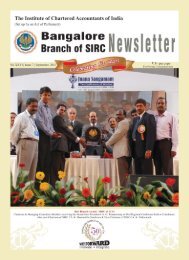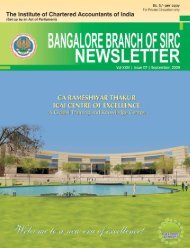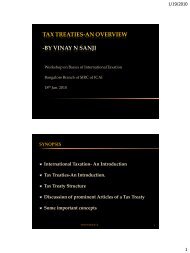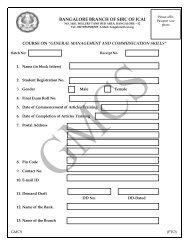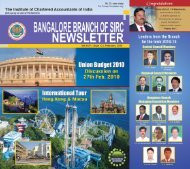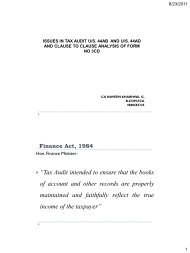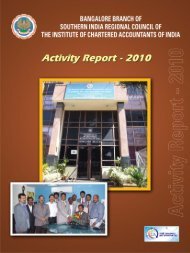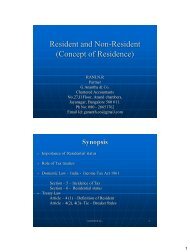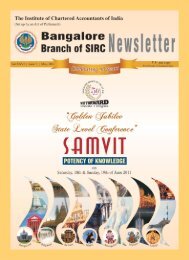November-December 2010 - Bangalore Branch of SIRC
November-December 2010 - Bangalore Branch of SIRC
November-December 2010 - Bangalore Branch of SIRC
- No tags were found...
You also want an ePaper? Increase the reach of your titles
YUMPU automatically turns print PDFs into web optimized ePapers that Google loves.
<strong>Bangalore</strong> <strong>Branch</strong> <strong>of</strong> <strong>SIRC</strong><strong>of</strong> the Institute <strong>of</strong> Chartered Accountants <strong>of</strong> India<strong>November</strong><strong>2010</strong>2
CPE AND OTHER PROGRAMS - <strong>November</strong>-<strong>December</strong> <strong>2010</strong>Date/Day Topic /Speaker Venue/Time CPE Credit03.11.10 Life in taxing world: A dilemma <strong>of</strong> tax collector <strong>Branch</strong> Premises 2 hrsWednesday and tax practitioner 06.00pm to 08.00pmDr. Sibichen K Mathew,IRS, Addl Commissioner <strong>of</strong> Income Tax10.11.10 Micr<strong>of</strong>inance - The rising sector & pr<strong>of</strong>essional <strong>Branch</strong> Premises 2 hrsWednesday opportunities for Chartered Accountants 06.00pm to 08.00pmCA. Sudha Suresh20.11.10 One day seminar on KVAT - Audit <strong>Branch</strong> Premises 6 hrsSaturday Delegate Fee: ` 700/- Details Page No: 8 10.00am to 05.30pm24.11.10 International Taxation - Estate tax planning - <strong>Branch</strong> Premises 2 hrsWednesday A new avenue for CAs 06.00pm to 08.00pmCA. Divakar Vijayasarathy01.12.10 An overview <strong>of</strong> IFRS & Challenges involved in <strong>Branch</strong> Premises 2 hrsWednesday first time adoptions 06.00pm to 08.00pmCA. Aditya Singhal04.12.10 Seminar on “Emerging Economic challenges The Lalit Ashok, <strong>Bangalore</strong> 6 hrsSaturday for Industry” 09.00am to 06.00pmDelegate Fee: ` 1,800/- Details Page No: 1608.12.10 Companies Bill 2009 & MCA Guidelines 2009 <strong>Branch</strong> Premises 2 hrsWednesday on Corporate Governance & CSR 06.00pm to 08.00pmCA. Vijay Raja11.12.10 Seminar on “Mergers and Aquisitions” 09.30am to 05.30pm 6 hrsSaturday Details Page No: 1715.12.10 Recent developments in Auditing Standards <strong>Branch</strong> Premises 2 hrsWednesday CA. D M Suresh 06.00pm to 08.00pm18.12.10 CPE Conference - Jnana Jyothi Convention Center, 12 hrsSaturday & “Jnanaarjana - Quest for Knowledge” Central College Campus,19.12.10 Delegate Fee : Members ` 1,800/- <strong>Bangalore</strong>Sunday Non-Members: ` 2,000/- Details Page No: 17Note : High Tea at 5.30 pm for programmes at 6.00 pm at branch premises.Advertisement Tariff for the <strong>Branch</strong> NewsletterColour full pageInside Black & WhiteOutside back ` 30,000/- Full page ` 15,000/-Inside front ` 24,000/- Half page ` 8,000/-Inside back ` 24,000/- Quarter page ` 4,000/-Advt. material should reach us before 22nd <strong>of</strong> previous month.Editor : CA. Shambhu Sharma H.Sub Editor : CA. Prasad S.R.DISCLAIMER : The <strong>Bangalore</strong> <strong>Branch</strong> <strong>of</strong> ICAI is not in anyway responsible for the result <strong>of</strong> any action taken on the basis<strong>of</strong> the advertisement published in the newsletter. The members, however, bear in mind the provision <strong>of</strong> the code <strong>of</strong> ethics whileresponding to the advertisements. The views and opinions expressed or implied in the <strong>Branch</strong> Newsletter are those <strong>of</strong> the authorsand do not necessarily reflect those <strong>of</strong> <strong>Bangalore</strong> <strong>Branch</strong> <strong>of</strong> ICAI.3 <strong>November</strong><strong>2010</strong>
<strong>Bangalore</strong> <strong>Branch</strong> <strong>of</strong> <strong>SIRC</strong><strong>of</strong> the Institute <strong>of</strong> Chartered Accountants <strong>of</strong> IndiaTAX UPDATES SEPTEMBER <strong>2010</strong>CA. Chythanya K.K., B.Com, FCA, LL.BVAT, CST, ENTRY TAX,PROFESSIONAL TAXPARTS DIGESTED:a) <strong>2010</strong>-11(15) KCTJ Part 6b) <strong>2010</strong> 69 Kar. L. J. Part 8 & 9c) 32 VST – Part 6d) 34 VST – Part 1 & 2Reference/Description<strong>2010</strong> (69) Kar. L. J. (St.) 105 :Notification No. KSA/CR-60/<strong>2010</strong>-11, <strong>Bangalore</strong>, Dated: 05.8.<strong>2010</strong> Thenotification specifies the procedure t<strong>of</strong>ile the monthly VAT return in FormVAT 100, electronically as also thestipulation to submit hard copy <strong>of</strong> thesaid electronic document every 6months. The same reads as follows:In exercise <strong>of</strong> the powers under thefirst proviso to sub-section(1) <strong>of</strong> Section 35 <strong>of</strong> the KarnatakaValue Added Tax Act, 2003, it ishereby notified with immediate effectthat commencing from the monthending on 31st July, <strong>2010</strong>, everydealer paying tax under Section 4 <strong>of</strong>the said Act may submit for everymonth, return in Form VAT 100electronically through internet on orbefore the 20th day <strong>of</strong> the succeedingmonth, in the following manner:(2) Every such dealer shall obtain his‘user name’ and ‘password’ from thejurisdictional Local VAT Officer(LVO) or VAT Sub-Officer (VSO), ifnot already communicated to him bythe jurisdictional LVO or VSO.(3) Every such dealer shall log on tothe website http://vat.kar.nic.in/ withthe ‘user name’ and ‘password’communicated to him by the LVO orVSO and proceed to submit the returnin Form VAT 100 electronically ,following the instructions andprocedure contained in the saidwebsite.(4) Every such dealer shall enter inthe website specified above theparticulars <strong>of</strong> any statutory formrequired to be filed along with anyreturn submitted in the websitespecified above and also file thestatutory form in the <strong>of</strong>fice <strong>of</strong> the LVOor VSO, following the instructionscontained in the website.(5) Every such dealer shall file to theLVO or VSO concerned, a dulysigned hard copy <strong>of</strong> the consolidatedstatement <strong>of</strong> all such electronicallysubmitted monthly returns for theperiod from April to September andOctober to March <strong>of</strong> every financialyear, downloaded from the websitehttp://vat.kar.nic.in/, within thirtydays after the close <strong>of</strong> thecorresponding period <strong>of</strong> six months.<strong>2010</strong> (69) Kar. L.J. 97 (HC) :Nagarjuna Construction CompanyLtd., <strong>Bangalore</strong> v. State <strong>of</strong> Karnataka& Others In the instant case, steeland steel products were used as rawmaterial and incorporated into civilworks or other works contracts in thesame form, except that the same wasfashioned to suit the requirement,before the same merged into theworks which was thereafter identifiedas immovable property. In the saidcontext the High Court <strong>of</strong> Karnatakaheld that at the time <strong>of</strong> incorporation,steel and steel products did not loosetheir nature or form and thereforecould not be subjected to tax, as thesaid goods are already subjected to taxas declared goods under the CST Act.It may be noted that Explanationbelow Rule 3 <strong>of</strong> the KVAT Actprovides that any amount paid asadvance to a dealer as a part <strong>of</strong>consideration for transfer <strong>of</strong> propertyin goods (whether as goods or in someother form) involved in the execution<strong>of</strong> a works contract shall be includedin his total turnover in the month inwhich execution <strong>of</strong> such workscontract commences. The High Courtobserved that in the said case thedealer had to pay tax thereon, eventhough there was no transfer <strong>of</strong>property in any goods involved. TheCourt therefore held that theExplanation certainly ran counter tothe tenor <strong>of</strong> the charging Section4(1)(c) and also ran counter to thedefinition <strong>of</strong> “taxable turnover”, ‘totalturnover’ and ‘turnover’ under theAct. It was also in direct conflict withArticle 366(29-A)(b) <strong>of</strong> theConstitution <strong>of</strong> India.Similarly, the High Court held thatSection 7 <strong>of</strong> the KVAT Act, whichcreates a legal fiction that atransaction <strong>of</strong> sale is completed forthe purposes <strong>of</strong> the Act when paymentis received as advance was akin tobringing to tax an agreement to sellgoods, even before the property in thegoods passes to the buyer. This wasplainly contrary to the very definition<strong>of</strong> “sale” under the Act itself.Therefore the Court held that to thesaid extent, the said provisions wereunconstitutional.In the aforesaidwelcome decision, the honourableHigh Court put a brake on the attempt<strong>of</strong> the legislature to keep on addingimpractical fictions into the tax law.Quashing the aforesaid Explanationas well as section 7 which had theeffect <strong>of</strong> putting the cart before the<strong>November</strong><strong>2010</strong>4
horse is a welcome relief to theharassed Taxpayers.[<strong>2010</strong>] 69 Kar. L.J. 112 (SC) : State<strong>of</strong> Bihar & Others v. KalyanpurCements Ltd. In the instant case theApex Court noted that when a StateGovernment gives an assurance andundertaking in the form <strong>of</strong> a policythen in fact it allows certain person(s)/industries to enter into individualventures, invest money etc. The saidindustries etc. based on suchassurances contained in the policy,enter into contacts and agreements.Therefore the Apex Court held thatin such a circumstance it was notjustified on the part <strong>of</strong> the StateGovernment to later on withdraw thepolicy and the benefit flowing fromthe said policy. The facts <strong>of</strong> the instantcase was that the Respondent being asick-unit its proposal to obtainfinancial assistance from variousfinancial institutions was approved onthe pre-condition that the restructuringpackage would be available only onthe company obtaining a sales taxexemption for a period <strong>of</strong> 5 years fromthe State Government in terms <strong>of</strong>Industrial Policy, 1995. A Writ <strong>of</strong>mandamus was filed before the HighCourt seeking direction to the State toissue necessary notification underclause 24 <strong>of</strong> the 1995 policy. The HighCourt had directed the StateGovernment <strong>of</strong> Bihar to issue followup notification to give effect to theprovisions <strong>of</strong> the Policy within onemonth and the said decision waschallenged by the appellant-Statewhich had been dismissed.In the aforesaid interesting decision,the Supreme Court issued amandamus to the State to issuenotification which was to be issuedin pursuance to policy declaration. Inthis interesting decision on doctrine<strong>of</strong> promissory estoppel, the SupremeCourt recognised the plight <strong>of</strong> thetaxpayers who had altered theirposition on the basis <strong>of</strong> the promisemade by the State. The State cannotissue the policy and refrain fromissuing any notification.[<strong>2010</strong>] 34 VST 1 (SC) :Commissioner <strong>of</strong> Trade Tax, U.P. v.Parikh Gramodyog Sansthan In theinstant case the Hon’ble SupremeCourt noting the distinction betweenelectronic and electrical goods held thatvoltage stabilizers are “electronicgoods” and not “electrical goods”,primarily because electrical goodsinvolve consumption <strong>of</strong> electricity,whereas an electronic device functionsthrough the creation <strong>of</strong> an electronvacuum in the semiconductor material.[<strong>2010</strong>] 34 VST 105 (Guj) : YashOrganics Ltd. v. State <strong>of</strong> Gujarat Inthe context <strong>of</strong> furnishing Form ‘C’ andavailing concessional rate <strong>of</strong> duty theGujarat High Court noted that a dealerwould not be entitled to the benefit <strong>of</strong>the concessional rate <strong>of</strong> tax if the ‘C’form submitted by him was defective.In the instant case the appellant’s casestood on a weaker footing inasmuch theTribunal had found that the C formssubmitted by the appellant were notgenuine. In the circumstances the Courtheld that the appellant could not bepermitted to avail the benefit <strong>of</strong>concessional rate <strong>of</strong> tax under theCentral Act. Further the Court observedthat even on basic principles, if the Cforms submitted by the appellant wereforged and the appellant had beenduped, at best the appellant might havea case against the purchasing dealer, butin no case could it be entitled to thebenefit <strong>of</strong> concessional rate based uponforged certificates.The aforesaid decision cautions thesellers against C form particularlywhen selling goods to new customers.Although it may not be possible tounearth if the C form is forged, it maybe necessary to carry out the duediligence particularly when dealingwith new customers for big orders.INCOME TAXPARTS DIGESTED:a) 326 ITR – Part 4 & 5b) 327 ITR – Part 1 & 2c) 192 Taxman – Part 4 & 5d) 193 Taxman – Part 1 & 2e) 125 ITD – Part 4f) 126 ITD – Part 2 & 3g) 128 TTJ – Part 1 & 2h) 132 TTJ – Part 1 & 3 to 5i) 42-A BCAJ – Part 6Reference/Description[<strong>2010</strong>] 327 ITR 19 (Bom) : CIT v.Shah Originals The instant case dealtwith export benefit under Section80HHC. The main contention wasthat the gains on account <strong>of</strong> foreigncurrency fluctuation had norelationship with the exports madeduring the year and that those receiptswere to be excluded from the exportturnover for the purpose <strong>of</strong>computation <strong>of</strong> deduction underSection 80HHC. The Bombay HighCourt noted that the fluctuation in thepresent case was not on account <strong>of</strong>the sale proceeds or for that matter onaccount <strong>of</strong> a delayed realisation <strong>of</strong> thesale proceeds. The fluctuation hadarisen in the deposits maintained bythe assessee in the EEFC account inconvertible foreign exchange after thecompletion <strong>of</strong> the export transaction.Further it was observed that anassessee who was an exporter was notunder an obligation <strong>of</strong> law to maintainthe export proceeds in the EEFC5 <strong>November</strong><strong>2010</strong>
<strong>Bangalore</strong> <strong>Branch</strong> <strong>of</strong> <strong>SIRC</strong><strong>of</strong> the Institute <strong>of</strong> Chartered Accountants <strong>of</strong> Indiaaccount but it was a facility which wasmade available by the RBI. Thetransaction <strong>of</strong> export was complete inall respects upon the repatriation <strong>of</strong>the proceeds. The discretion to receivethe proceeds either in rupeeequivalent or in convertible foreignexchange was with the assessee. Theexchange fluctuation in the EEFCaccount arose after the completion <strong>of</strong>the export activity and did not bear aproximate and direct nexus with theexport transaction so as to fall withinthe expression “derived” as perSection 80HHC(1). Therefore it washeld that the said gains could not beregarded as business income butwould have to be categorised asincome from other sources.[<strong>2010</strong>] 327 ITR 278 (P&H) : CIT v.Gurnam Singh With reference to thededuction under Section 54B, thePunjab & Haryana High Court held thatwhere there was a sale <strong>of</strong> agriculturalland and the proceeds <strong>of</strong> the same wereused to invest in the purchase <strong>of</strong> newland which was registered under theassessee’s son’s name as co-owner andthe new land continued to be used foragricultural purpose, the assessee in thesaid case was held entitled to deductionunder Section 54B.[<strong>2010</strong>] 193 Taxman (BN-III) (Part-2) [<strong>2010</strong>] 6 taxmann.com 120(Bom.): Bhatia Nagar Premises CooperativeSociety Ltd. v. UOI In theinstant case it was held that Section50C was constitutionally valid. Whileholding so, it was observed that, thetwo contentions <strong>of</strong> the assesseenamely, (1) that Section 50C isbeyond the legislative competenceand (2) that it is violative <strong>of</strong> Article14 <strong>of</strong> the Constitution <strong>of</strong> India, weredevoid <strong>of</strong> merits.(<strong>2010</strong>) 128 TTJ (Mumbai) 32 :Maharashtra State RoadDevelopment Corpn. Ltd. v. Assist.CIT two In the instant case theassessee was engaged in the business<strong>of</strong> providing infrastructure, namely,building flyover, roads, bridges,express highway, ROB etc. It wascarrying on its activities <strong>of</strong> developingand maintaining infrastructurefacilities by permitting vehicles to plyover those structures. The MumbaiTribunal in such a scenario noted thatthe said assets could not be consideredas merely the setting in which thebusiness was carried on. It was furthernoted that the said assets were tools<strong>of</strong> trade and essential adjuncts to thebusiness. Therefore applying thefunctional test, it was held that thesame constituted plant and wereentitled to depreciation at 25 per cent.(<strong>2010</strong>) 128 TTJ (Chd) 116 : RakeshChauhan v. Dy. DIT (InternationalTaxation) In the instant case, theassessee made payment towardspurchase <strong>of</strong> land to a power <strong>of</strong>attorney (PoA) holder, <strong>of</strong> 5 nonresidentco-owners, one Mr. P whowas a resident <strong>of</strong> India. Theagreement was entered into with P andthe Revenue did not dispute the factthat the payment had been made to Pas a representative nominated by thenon-residents. The rights in the landwere assigned to P by way <strong>of</strong> PoAexecuted by the co-owners. Thus, hewas not merely acting as an agent <strong>of</strong>the non-residents to receive moneybut had the right to alienate the landby virtue <strong>of</strong> the rights vested in himby the PoA. The Chandigarh Tribunalnoted that Section 195 applies onlyto payments which are made to nonresidents.In the instant case P towhom the payments were made wasa resident and therefore held thatSection 195 was not applicable in theinstant case and the assessee could notbe treated as an assessee in default.The aforesaid decision althoughfavourable runs counter to thedecision <strong>of</strong> jurisdictional tribunal inthe case <strong>of</strong> Mrs. Meena S. Patil vs.Assistant Commissioner <strong>of</strong> IncomeTax [2008] 113 TTJ (Bang) 863.(<strong>2010</strong>) 132 TTJ (Chd) (SB) 1 : Dy.CIT v. Quark Systems (P) Ltd. Theinstant case dealt with TransferPricing provisions and thecomputation <strong>of</strong> the arm’s length pricewhile selecting comparable cases. Inthe light <strong>of</strong> the said background theChandigarh Tribunal noted that abusiness organization with negativenet worth could not be treated at parwith a normal business organization.The turnover <strong>of</strong> one comparablecompany - Imercious was only Rs.1.47 crore, whereas no othercomparable had less than Rs. 5 croresturnover and the assessee had aturnover <strong>of</strong> Rs. 13.06 crores. TheTribunal noted that the filter <strong>of</strong> lowerturnover at Rs. 1 crore was withoutany reasonable basis and there was n<strong>of</strong>ilter for higher turnover at all. Theapplication <strong>of</strong> turnover filter did notseem to have any rationale basis. TheTribunal went on to observe that itwas improper to proceed on the basisthat the turnover <strong>of</strong> Rs. 1 crore toinfinite was a reasonableclassification as turnover base. TheTribunal opined that merely becausea comparable was making loss, itcannot be excluded from the list <strong>of</strong>comparables for the purposes <strong>of</strong>computation <strong>of</strong> ALP; Imercius was acase in which not only functional areawas different, but had a negative networth and also it had no comparisonwith the assessee company.The Tribunal took the view that ifImercius Technologies had sufferedheavy losses and, therefore, it was not<strong>November</strong><strong>2010</strong>6
treated as comparable by the taxauthorities, they also have to considerthat the Datamatics had earnedextraordinary pr<strong>of</strong>it and had a hugeturnover, besides differences in assetsand other characteristics and thereforethe same also had to be excluded as acomparable.(<strong>2010</strong>) 132 TTJ (Mumbai) 20 :Linklaters LLP v. ITO (InternationalTaxation) In the context <strong>of</strong> DTAAbetween India and UK and theprovisions <strong>of</strong> Article 7 dealing withBusiness Pr<strong>of</strong>its, the MumbaiTribunal observed that the said Articleprovides that if the enterprise carrieson business through a PE, the pr<strong>of</strong>its<strong>of</strong> the enterprise may be taxed in theother State but only so much <strong>of</strong> themas was “directly or indirectlyattributable to that PE”. The Tribunalnoted that inclusion <strong>of</strong> ‘pr<strong>of</strong>itsindirectly attributable to PE’ clearlyincorporated a force <strong>of</strong> attractionprinciple in the tax treaty. Therefore,in addition to taxability <strong>of</strong> income inrespect <strong>of</strong> services rendered by the PEin India, any income in respect <strong>of</strong> theservices rendered to an Indian project,which was similar to the servicesrendered by the PE, had to also betaxed in India, irrespective <strong>of</strong> the factwhether such services were renderedthrough the PE or directly by thegeneral enterprise. The Tribunal heldthat this indirect attribution wasenough to bring the income from suchservices within the ambit <strong>of</strong> taxabilityin India. Thus it was held that theentire pr<strong>of</strong>its relating to servicesrendered by the assessee, whether inIndia or outside India, in respect <strong>of</strong>Indian projects were taxable in India.In the aforesaid decision, the force <strong>of</strong>attraction principle was drawn in byinference. With due respect, it is statedthat the principle <strong>of</strong> force <strong>of</strong> attractionhas to be explicitly provided for likein the case <strong>of</strong> Indo US DTAA andcannot be inferred. It seems thehonourable tribunal hasmisconstrued the use <strong>of</strong> word‘indirectly‘ in the context <strong>of</strong>attribution and wrongly held that thesame is applicable for determiningthe charge itself.(<strong>2010</strong>) 132 TTJ (Mumbai) 468 : Ms.Nita A. Patel v. ITO In the instantcase property was purchased by theassessee by way <strong>of</strong> agreement dt. 27 thDec., 1990 and the assessee alsoobtained the certificate under s.269UL(3) (dealing with Restrictionson registration, etc., <strong>of</strong> documents inrespect <strong>of</strong> transfer <strong>of</strong> immovableproperty) on 13 th Feb., 1991. In thecontext <strong>of</strong> determination <strong>of</strong> therelevant date for indexation <strong>of</strong> cost theAO held that since the assessee gotpossession <strong>of</strong> the flat after paying Rs.18,00,000 to the tenant only on 6 thJan., 1992, she held the property fromthat date and accordingly calculatedthe indexed cost <strong>of</strong> acquisition fromthat date. However the MumbaiTribunal countering the stand <strong>of</strong> theAO noted that the word ‘held’ usedin the Explanation to Section 48referred to ownership rights only andnot physical ownership or physicalpossession <strong>of</strong> the property. TheTribunal therefore held that theassessee was holding the rights in theproperty from 27 th Dec., 1990 andaccordingly the indexation has to beallowed from that date.(<strong>2010</strong>) 132 TTJ (Mumbai)(SB) 505:Dy. CIT(International Taxation) v.Bank <strong>of</strong> Bahrain & Kuwait In theinstant case the Mumbai Tribunaldealt with the mercantile system <strong>of</strong>accounting and the concept <strong>of</strong> accrualas applicable in the case <strong>of</strong> a forwardcontract. The Tribunal held that if theguarantee commission wasrefundable then it could not be saidthat absolute right to the commissionhad accrued in favour <strong>of</strong> the guarantor(assessee) at the time <strong>of</strong> execution <strong>of</strong>contract for furnishing guarantee byit. However if the guaranteecommission was not dependent uponperiod <strong>of</strong> guarantee and, thus, hadaccrued in favour <strong>of</strong> the assessee onthe date <strong>of</strong> execution <strong>of</strong> contract forfurnishing guarantee then the samehad to be taxed in the year in whichthe guarantee was furnishedirrespective <strong>of</strong> the period to whichguarantee remained alive.In the instant case the Assessee-bankentered into forward contracts withclients to buy or sell foreign exchangein order to hedge against possiblefuture financial loss on account <strong>of</strong>fluctuation in the rate <strong>of</strong> foreigncurrency. If an anticipated liability iscoupled with present obligation andonly quantification would varydepending upon the terms <strong>of</strong> thecontract, then a liability is said to havecrystallized on the balance sheet date.In the instant case, the event <strong>of</strong>entering into the contract andundertaking <strong>of</strong> obligation to meet theliability had already taken place. TheTribunal noted that the contention <strong>of</strong>the Revenue, that the liability wouldarise only when the contract matures,was completely divorced from theprinciples <strong>of</strong> commercial accounting.The Tribunal further observed thatanticipated losses on account <strong>of</strong>existing obligation as on 31st March,determinable with reasonableaccuracy, being in the nature <strong>of</strong>expenditure/accrued liability, have tobe taken into account while preparingfinancial statements. Further withreference to AS -11 the Tribunal notedthat the same mandates in a situation7 <strong>November</strong><strong>2010</strong>
<strong>Bangalore</strong> <strong>Branch</strong> <strong>of</strong> <strong>SIRC</strong><strong>of</strong> the Institute <strong>of</strong> Chartered Accountants <strong>of</strong> Indialike in the present case, where thetransaction is not settled in the sameaccounting period, the effect <strong>of</strong>exchange difference had to berecorded on 31st March. The foreignexchange held by the assessee-bankwas its stock-in-trade and it enteredinto forward foreign exchangecontracts in order to protect its interestagainst wide fluctuation in theexchange rate. Thus, this contract wasincidental to assessee’s holding <strong>of</strong> theforeign currency as current asset andit could not be said that the forwardcontract had no trappings <strong>of</strong> stockin-trade.The Tribunal therefore held that,when pr<strong>of</strong>its were being taxed by theDepartment in respect <strong>of</strong> such unmaturedforward foreign exchangecontracts then there was no reason todisallow the loss as claimed byassessee in respect <strong>of</strong> same contractson the same footing. Therefore, lossincurred by the assessee on account<strong>of</strong> evaluation <strong>of</strong> the contract on thelast date <strong>of</strong> the relevant accountingperiod i.e., before the date <strong>of</strong> maturity<strong>of</strong> the forward contract, was allowableas deduction.One Day Seminar on KVAT – AuditOn Saturday, 20 th <strong>November</strong> <strong>2010</strong>between 10.00am and 05.30pm At <strong>Branch</strong> Premises6 HrsCPETimings Topics Speakers10.00am to 11.30am Approach to KVAT Audit process CA. L. Sridharby Pr<strong>of</strong>essionals11.30am to 11.45amTEA BREAK11.45am to 01.15pm Audit Report documentations and CA. N. Syama SundaranPenal provisions01.15pm to 02.15pmLUNCH02.15pm to 03.45pm Important clauses <strong>of</strong> FORM VAT 240 CA. S. Vishnumurthy03.45pm to 04.00pmTEA BREAK04.00pm to 05.30pm Discussion on Practical issues on CA. L. SridharKVAT AuditCA. N. Syama SundaranCA. S. VishnumurthyCA. S. RamasubramanianCA. Sanjay N. DhariwalDelegate Fee: ` 700/-(Cash / Cheque in favour <strong>of</strong> “<strong>Bangalore</strong> <strong>Branch</strong> <strong>of</strong> <strong>SIRC</strong> <strong>of</strong> ICAI” payable at <strong>Bangalore</strong> )Seminar Co-ordinator: CA. Sanjay M. DhariwalFor registration & further details please contact:<strong>Bangalore</strong> <strong>Branch</strong> <strong>of</strong> <strong>SIRC</strong> <strong>of</strong> ICAI,“ICAI Bhawan”, 16/O, Millers Tank Bed Area, Vasanth Nagar, <strong>Bangalore</strong>-560052Tel: 080 – 30563500 / 513 Email: blrregistrations@icai.org<strong>November</strong><strong>2010</strong>8
RECENT JUDICIALPRONOUNCEMENTSIN INDIRECT TAXESCA. N.R. Badrinath, B. Com., Grad C.W.A., F.C.A.,CA. Madhur Harlalka, B. Com., F.C.A.CENVAT CREDIT:Dutiable and exempted goods1. In the present case, the appellantavailed <strong>of</strong> CENVAT credit oninput services, which are used formanufacture <strong>of</strong> both dutiable andexempted final products and theproportionate CENVAT creditrelating to exempted finalproducts was reversed. However,adjudicating authority demandedan amount <strong>of</strong> 10% <strong>of</strong> value <strong>of</strong>exempted goods and proposed tolevy the penalty. The Tribunal heldthat Finance Act, <strong>2010</strong> hasamended the Rule 6 <strong>of</strong> CENVATCredit Rules, 2004 retrospectivelyfor reversal <strong>of</strong> proportionateCENVAT credit <strong>of</strong> exemptedfinished goods and payment <strong>of</strong>interest @ 24% for the period fromthe date availment <strong>of</strong> CENVATcredit upto date <strong>of</strong> reversal <strong>of</strong>proportionate CENVAT credit <strong>of</strong>exempted goods. Accordingly,penalty set aside and directed topay interest @ 24% in terms <strong>of</strong>amended Rule 6 <strong>of</strong> CENVATCredit Rules, 2004. [M/s. StandardInspirational Precision EngineersPrivate Limited Vs CCE,<strong>Bangalore</strong>, <strong>2010</strong>-TIOL-1332-CESTAT-BANG]Taxable and exempted services2. In the present case, the appellanthas availed the CENVAT credit oncapital goods, which were used forprovision <strong>of</strong> taxable and exemptedservices and the CENVAT Creditwas utilised in excess <strong>of</strong> 20% <strong>of</strong>output tax liability <strong>of</strong> taxableservices. Tribunal while grantingthe stay application held that therestriction under Rule 6(3) is beingnot applicable to credit on capitalgoods, demand prima facie notsustainable and full waiver <strong>of</strong> predepositallowed and stay granted.[M/s Bharat Sanchar Nigam Ltd VsCCE, Thiruvananthapuram, <strong>2010</strong>-TIOL-1262-CESTAT-BANG]Capital goods vs. constructionmaterials3. The issue in the present casewhether CENVAT credit on MSPlates, MS Joints and MS Steel etcare available in light <strong>of</strong> exclusion<strong>of</strong> construction materials from thedefinition <strong>of</strong> Capital Goods.Tribunal held that the issue nowstands squarely settled against theassessees by the Tribunal LargerBench decision in the case <strong>of</strong>Vandana Global Ltd. & Others(<strong>2010</strong>-TIOL-624-CESTAT-DEL-LB) and relining on the abovedecision CENVAT credit is notadmissible on MS plates, MSjoints and MS steel. [CCE,Tiruchirappalli Vs M/s. ThiruArooran Sugars Ltd, <strong>2010</strong>-TIOL-1311-CESTAT-MAD]4. The issue in the present waswhether CENVAT credit onplates, angles and channels usedfor supporting structures andfurnace stands is admissible.Tribunal held that plates, angles,channels are constructionmaterials for supporting structuresand the definition <strong>of</strong> capital goodsspecifically excludes suchconstruction materials from thescope and in view <strong>of</strong> the LargerBench decision in case <strong>of</strong> M/sVandana Global Ltd (<strong>2010</strong>-TIOL-624-CESTAT-DEL-LB), theCENVAT credit is not admissible.[CCE Vs M/s Core Fabs Project(P) Ltd, <strong>2010</strong>-TIOL-1259-CESTAT-DEL]Removal <strong>of</strong> inputs as such forexport under Bond5. The issue in the present case iswhether cenvated inputs could beremoved for export under bond oron payment <strong>of</strong> an amount equalto credit availed. The Boardinstruction No.345/2/2000-TRUdt.29.8.2000 permits clearance <strong>of</strong>capital goods for export underbond specifically without reversal<strong>of</strong> CENVAT credit. Hence, theexport <strong>of</strong> inputs is allowablewithout payment <strong>of</strong> excise dutyunder Bond. The Tribunal hasrelied on M/s. VideoconInternational Ltd. Vs CCEVadodara (2008-TIOL-2781-CESTAT-AHM). [M/s RootsIndustries Ltd Vs CCE,Coimbatore, <strong>2010</strong>-TIOL-1305-CESTAT-MAD]Removal <strong>of</strong> goods as such6. In the present case, the respondentare manufacturers <strong>of</strong> tyres and thesame are sold along with boughtout tubes and flaps in the retailmarket and also to originalequipment manufacturers (OEMs)9 <strong>November</strong><strong>2010</strong>
<strong>Bangalore</strong> <strong>Branch</strong> <strong>of</strong> <strong>SIRC</strong><strong>of</strong> the Institute <strong>of</strong> Chartered Accountants <strong>of</strong> Indianamely, automobile manufacturersfor fixing in new vehicles. Therespondent did not claim anyCENVAT credit on tubes and flapswhich were sold in the retail marketalong with tyres. Consequentlythey are claiming exemption frompayment <strong>of</strong> excise duty on sale <strong>of</strong>tubes and flaps and duty was paidonly on the tyres sold along withsuch tubes and flaps. However, therespondent claimed CENVATcredit on tubes and flaps, whichwere sold to OEMs on the groundthat tubes and flaps are inputs inthe form <strong>of</strong> accessories to tyre soldby them to OMEs along with tyres.Further, the respondent has billedseparately for tyres and tubes andflaps. The Honourable High Courtheld that the appellant is notentitled to CENVAT credit ongoods sold to OEMs since removal<strong>of</strong> purchased tubes and flaps alongwith tubes amounts to clearance assuch. The packing <strong>of</strong> tube withinthe tyre along with the flap andpartly inflating the tube does notmake the transaction anythingother than a transfer or sale in thesame form. In order to justify aninput tax credit, the respondentassesseeought to have used theitem purchased as an input,whether it be accessory or not.Even though tubes and flaps areadmittedly accessories for use <strong>of</strong>tyre, the purchase and resale <strong>of</strong>tubes and flaps along with the tyredoes not make the transactionanything different from trading.The respondent-assessee isengaged in purchase and resale <strong>of</strong>tubes and flaps along with tyres andrightly they don’t claim anyCENVAT credit for the duty paidon tubes and flaps. There is noscope for penalty because the claimis made by the respondent onaccount <strong>of</strong> misunderstanding <strong>of</strong>law which found acceptance withthe Tribunal. Consequently penaltylevied will stand cancelled. [CCEVs M/s. Appollo Tyres Ltd, <strong>2010</strong>-TIOL-670-HC-KERALA-CX]Transportation and Insuranceservices <strong>of</strong> residential building:7. The issue in the present case iswhether credit <strong>of</strong> the service taxpaid on the vehicle services usedin the residential colony and onthe insurance <strong>of</strong> the residentialbuilding etc is available. Tribunalheld that the expression“business” appearing in Rule 2(l)<strong>of</strong> CENVAT Credit Rules, 2004 isan integrated/continued activityand not confined or restricted tomere manufacture <strong>of</strong> product andthat activities in relation tobusiness can cover all activitiesrelated to functioning <strong>of</strong> abusiness. The expression“business” is <strong>of</strong> wide import inphysical statutes. Credit <strong>of</strong> servicetax paid on the vehicle servicesused in the residential colony andon the insurance <strong>of</strong> the residentialbuilding etc. is allowable.Tribunal has relied on decisions<strong>of</strong> Manikgarh Cement v. CCE &Cus. Nagpur (2008-TIOL-133-CESTAT-MUM) , Millipore IndiaLtd. v. CCE, <strong>Bangalore</strong> (2009-TIOL-490-CESTAT-Bang), CCE,Aurangabad v. EnduranceSystems India Pvt. Ltd. (2009-TIOL-210-CESTAT-MUM),CCE, Chennai v. SundaramClayton Ltd. (<strong>2010</strong>-TIOL-69-CESTAT-MAD). [M/s. UltratechCement Ltd Vs CCE,Bhavnagar,<strong>2010</strong>-TIOL-1325-CESTAT-AHM]SERVICE TAX:Business Auxiliary Service - CallCentre Services8. The issue in the present case iswhether service <strong>of</strong> encryption andcompilation <strong>of</strong> data pertaining toclients and provision <strong>of</strong> detailsthere<strong>of</strong> on telephone to callers/prospective customers <strong>of</strong> clients iscall centre services. Tribunal heldthat in case <strong>of</strong> traditional callcenter, normally the 2nd partyapproaches the clients i.e. 1stparty to keep/ maintain database<strong>of</strong> the products/ services <strong>of</strong>fered /dealt with by the 1st party for itsuse by the inquirer / prospectivebuyer. However, in the presentcase the inquirer who makes callfor help / assistance and all thethree parties are benefited. The 1stparty, in case <strong>of</strong> traditional callcenter, is benefited by way <strong>of</strong>better working and satisfaction toinquirer whereas in the presentcase the 1st party is benefited byway <strong>of</strong> promotion <strong>of</strong> sales /marketing <strong>of</strong> products/ servicesdealt with by them. The 2nd party,in both the cases, gets businessand consideration. The 3rd party,in both the cases, gets help,assistance etc. The only differenceis methodology <strong>of</strong> theirfunctioning. In both the cases, the1st party makes payment to 2ndparty. Because <strong>of</strong> the singledifference in functioning, onecannot conclude that theappellants are not a call center,though they satisfy all theconditions <strong>of</strong> a defined call center.Hence, service <strong>of</strong> encryption andcompilation <strong>of</strong> data pertaining toclients and provision <strong>of</strong> detailsthere<strong>of</strong> on telephone to callers /prospective customers <strong>of</strong> clients is<strong>November</strong><strong>2010</strong>10
‘call centre service’. The callcentre services were exemptedfrom service tax till 28.02.2006under category <strong>of</strong> BAS. [CST,Ahmedabad Vs M/s Citizen Info-Line Ltd, <strong>2010</strong>-TIOL-1340-CESTAT-AHM]Transport <strong>of</strong> the Goods throughpipeline9. In the present case, appellants hasestablished pipeline with a viewto transmit the natural gas throughsuch pipelines. Service taxdepartment has demanded theservice tax under the category“Clearing and ForwardingServices” for the period prior to16.06.2005 on the ground that theappellant are not having anywarehouse and are not selling thegas by raising invoices on behalf<strong>of</strong> the gas suppliers. Tribunal heldthat service tax was introduced forthe first time in respect <strong>of</strong> servicesfalling under the category <strong>of</strong>“Transport <strong>of</strong> the Goods throughpipeline or other conduit service”under Section 65(105)(zzz) <strong>of</strong>Finance Act, 1994 w.e.f. 16.6.05.The appellant not having anywarehouse and not selling the gasby raising invoices on behalf <strong>of</strong>the gas suppliers are in the nature<strong>of</strong> assumptions and presumptions,inasmuch as the same takes intoconsideration the hypotheticalsituation <strong>of</strong> the appellantsupplying the gas in cylindersinstead <strong>of</strong> through pipe line. Taxcannot be confirmed on the basis<strong>of</strong> “ifs and buts” and required totake into consideration the actualfact available. Further Tribunalheld that Tribunals, in number <strong>of</strong>matters, has held that when a newservice is introduced, for thepurpose <strong>of</strong> levy <strong>of</strong> service taxfrom a specified date, it has to beheld that the said service was notliable to tax prior to the date <strong>of</strong>introduction. [M/s Gujarat StatePetronet Ltd Vs CST, Ahmedabad,<strong>2010</strong>-TIOL-1289-CESTAT-AHM]Transport <strong>of</strong> goods by Road10. In the present case, the appellantimported yarn from Nepal andNepal supplier engaged Indiantransporter for transport <strong>of</strong> yarnform Nepal to India. The Nepalsupplier has billed separately forsupply <strong>of</strong> yarn and freight charges.Service tax department hasdemanded the service tax ontransportation services from theappellants. Tribunal held that theperson who engages and paysfreight charges is liable to payservice tax under Section 68(2) <strong>of</strong>the Finance Act, 1994 read withRule 2 (1) (d) (v) <strong>of</strong> Service TaxRules, 1994. In the present case,appellant neither engaged thetransporters and nor paid freightcharges to the transporters andappellants are not agents <strong>of</strong> theNepal suppler. Further, thetransporters are in India thus, thereis no question <strong>of</strong> import <strong>of</strong> service.Hence, demand <strong>of</strong> services tax onfreight charges are not sustainableand set aside. [M/s. SumangalamSuitings Pvt Ltd Vs CCE, Jaipur,<strong>2010</strong>-TIOL-1284-CESTAT-DEL]Maintenance and Repair <strong>of</strong> Roads:11. The issue in the present case iswhether the road management,maintenance, or repair serviceswere liable to service tax from16.06.2005 to 26.07.2009, whennotification no. 23/2009-ST Dt,27.07.2009 has grantedexemption from the service taxlevy on all persons providingmanagement, maintenance orrepairs <strong>of</strong> roads. The HonourableHigh Court held that theexemption under notification 23/2009-ST is prospective w.e.f27.7.2009 and cannot be givenretrospective effect in the absence<strong>of</strong> specific and express provisionin the notification. TheHonourable High Court reliedupon the Honourable SupremeCourt decision <strong>of</strong> Commissioner<strong>of</strong> Customs Vs. Spice Telecom(2006-TIOL-146-SC-CUS-LB).Further, it was held that it is forthe Government to considerwhether a notification should begiven retrospectively, and if so, upto what period and unless it is soprovided, the Tribunal or even theHigh Courts have no power togrant retrospective effect for anotification in the interpretationprocess. Accordingly, writpetitions were dismissed. [M/sKarvembu & Co Vs The UnderSecretary To Govt Of India, <strong>2010</strong>-TIOL-676-HC-MAD-ST]Construction <strong>of</strong> residential/commercial complexes12.Construction <strong>of</strong> residential /commercial complexes serviceswere undertaken by the appellantson their own land. The appellantsalso entered into agreements tosell such complexes aftercompletion. Service Taxdepartment demanded the servicetax under the category <strong>of</strong>construction <strong>of</strong> residential /commercial complexes services.Tribunal held that agreement tosell is not being final and servicesprovided till the execution <strong>of</strong>proper sale deeds would beregarded as self service in terms<strong>of</strong> Board’s Circular No. 108 dated29.01.2009. Hence, prima facie11 <strong>November</strong><strong>2010</strong>
<strong>Bangalore</strong> <strong>Branch</strong> <strong>of</strong> <strong>SIRC</strong><strong>of</strong> the Institute <strong>of</strong> Chartered Accountants <strong>of</strong> Indiasuch services are not liable toservice tax and pre-deposit iswaived in full. [M/s Korath GulfLinks Builders Private Limited VsCCE, Cochin, <strong>2010</strong>-TIOL-1257-CESTAT-BANG]Business Auxiliary Services13. In the present case, the appellantwas engaged in processing andassembling jeans buttons withmetal inserts and nylon inserts andprocessing <strong>of</strong> needle threader. Theservice department demanded theservice tax under the category“Business Auxiliary Services”.Tribunal held that definition <strong>of</strong>Business Auxiliary Service didnot include processing <strong>of</strong> goodsat any time before 16.6.2005 anddemand is required to be requantifiedfor the period post16.6.2005 only. [M/s. N.K.Fasteners Vs CCE, Salem, <strong>2010</strong>-TIOL-1237-CESTAT-MAD]14.In the present case, appellantclaimed refund <strong>of</strong> service tax paidon input services used in exportedservices under notification no. 12/2005-ST. However, adjudicatingauthority has denied refund <strong>of</strong>service tax on the ground that adeclaration <strong>of</strong> input services wasnot filed before effecting exports.Tribunal held that proceduralrequirement (i.e. filing declaration<strong>of</strong> input services) cannot be usedto deny a substantive benefit.Tribunal relied upon CST DelhiVs. Convergys India Pvt. Ltd.(2009-TIOL-888-CESTAT-DEL)CST Delhi Vs. Keane WorldzenIndia Pvt. Ltd. (2008-TIOL-496-CESTAT-DEL). Further, the caseis remanded to the originaladjudicating authority to considerthe eligibility <strong>of</strong> refund in terms<strong>of</strong> conditions and limitations in thenotification. [M/s. Manubhai &Co Vs CST, Ahmedabad, <strong>2010</strong>-TIOL-1307-CESTAT-AHM]Outdoor Catering15.In the present case appellantsentered into agreement withNational Institute <strong>of</strong> BankManagement to prepare food andserve in the institute canteen. TheInstitute has to provide water,electricity, kitchen equipment,crockery-cutlery, furniture,cooking gas/fuel etc. Show causenotice was issued to the appellantdemanding service tax under thecategory outdoor catering servicesand also proposed to levypenalties for non payment <strong>of</strong>service tax. Tribunal held that themere activity <strong>of</strong> preparation andserving food where the facilityrelating to maintenance <strong>of</strong> canteenincluding furniture, electricity,water etc. is provided by thecompany does not fall underoutdoor catering services as heldby the Tribunal in the case <strong>of</strong>Rajeev Kumar Gupta vs.Commissioner <strong>of</strong> Central Excise(2009-TIOL-864-CESTAT-DEL).Hence, the above service don’tqualify as “Outdoor CateringService”. Further, the appellantsare paying service tax and interestunder a bonafide beliefstrengthened by CESTAT decisionin Rajeev Kumar Gupta and hencethe Penalty u/s 78 is notimposable. [M/s. KalsisKitchenette Vs CCE, Pune, <strong>2010</strong>-TIOL-1319-CESTAT-MUM]CENTRAL EXCISEStay beyond 180 days:16.The issue in the present casebefore the Honourable High courtis whether the Tribunal isempowered to grant stay beyond180 days and whether the same isautomatic. Honourable HighCourt held that Tribunal isempowered to grant stay beyond180 days, but extension is notautomatic and it has to bespecifically granted if the assesseeis not at fault and the Tribunal forreasons beyond its control isunable to dispose <strong>of</strong> the appealwithin 180 days from the date <strong>of</strong>the grant <strong>of</strong> order <strong>of</strong> stay. Merelybecause there is no expressprovision provided for extendingstay granted, it cannot be said thatTribunal has no power to extendgrant <strong>of</strong> stay. In case <strong>of</strong> anapplication made by the assessee,the Tribunal has the power toextend the order <strong>of</strong> stay and theorder <strong>of</strong> stay is not automatic.[CCE, Mangalore Vs M/s IndianOil Corporation, <strong>2010</strong>-TIOL-695-HC-KAR-CX]Lubricants Waste17. In the present case, the appellantsused lubricants in the plant andmachinery and the same wasdrained out after it became unfitfor further use. Such drain out oilwas sold as waste oil. CentralExcise department demanded theexcise duty on waste oil sold.Tribunal held that waste oil isnothing but lubricant which afteruse over a period <strong>of</strong> time becomesunfit for further use and wasdrained out. The waste lubricatingoil drained out after use <strong>of</strong>lubricant over a period <strong>of</strong> time isnon-excisable. Moreover thatheading 34.03 covers “lubricatingpreparations (including cutting oilpreparations, bolt or nut releasepreparations, anti rust or anticorrosion preparations and mould<strong>November</strong><strong>2010</strong>12
eleased preparations based onlubricants) and preparations <strong>of</strong> akind used for oil or greasetreatment <strong>of</strong> textile material,leather, fur skin or other materials,but excluding preparationscontaining, as basic constituent,70% or more by weight <strong>of</strong>petroleum oil or <strong>of</strong> oils obtainedfrom bituminous minerals”. Theproduct in question is waste oilobtained by draining out usedlubricants from the machineryafter a long period <strong>of</strong> its use. Thisby itself is not the answer to thedescription <strong>of</strong> the goods coveredby heading 34.03. Hence, usedlubricants removed as waste oil isnot excisable goods and hencecredit is not required to bereversed. [M/s Yamaha MotorsIndia (P) Ltd Vs CCE, Noida,<strong>2010</strong>-TIOL-1285-CESTAT-DEL]18. Mere fact that the order <strong>of</strong> theappellate authority is not“acceptable” to the department isin itself an objectionable phrasefor not following it unless itsoperation has been suspended bya competent Court. It has held thatif this healthy rule is not followed,the result will only be undueharassment to assessee and chaosin administration <strong>of</strong> tax laws. [M/s. Allovers and Lace PrivateLimited Vs CCE, Pune, <strong>2010</strong>-TIOL-1244-CESTAT-MUM]CUSTOMSSettlement Commission19.The issue in the present casebefore the honourable High Courtis whether “SettlementCommission” has jurisdiction tosettle drawback issues. It is to benoted that drawback is nothing butremission <strong>of</strong> duty on account <strong>of</strong>the statutory provisions in the Actand scheme framed by theGovernment <strong>of</strong> India. Theapplication can be made withsettlement commissions in respect<strong>of</strong> a “case” in terms section127B(1) <strong>of</strong> the Customs Act andthe case is defined as `any’proceeding under this Act or anyother act <strong>of</strong> the levy, assessmentand collection <strong>of</strong> customs dutyunder section 127A(b) <strong>of</strong> CustomsAct, 1962. Accordingly, aproceeding for recovery <strong>of</strong>drawback <strong>of</strong> duties could betreated as a “case”. Thus, theSettlement Commission hadjurisdiction to deal with thequestion relating to the recovery<strong>of</strong> drawback erroneously paid bythe Revenue. [UOI Vs CC & CCE,Mumbai, <strong>2010</strong>-TIOL-687-HC-MUM-CUS]CENTRAL SALES TAX:Sale in the course <strong>of</strong> import:20. In the present case, the appellantsentered into agreement withN.T.P.C for design, supply,erection and commissioning <strong>of</strong>Ash Handling Plant and theappellants imported pipes forbuilding the Ash plant. Each pipeswere embossed as - “NTPC-FARAKKA STG-II(2x500 MW)Indure Limited (Ash Handling).Such pipes were used in theerection <strong>of</strong> the Ash HandlingPlant. The appellant claimed theexemption <strong>of</strong> sale in the course <strong>of</strong>import under section 5(2) <strong>of</strong>Central Sales Tax Act, 1956.However, West Bengalcommercial tax department hasdemanded the sales tax onimported pipes used in theexecution <strong>of</strong> works contract on theground that it was neitherobligatory nor mandatorilyrequired for the Company to haveimported the goods in question.There was no contractual or legalobligation on their part to do so.The only obligation required to beperformed by the Company underthe terms <strong>of</strong> the Letter <strong>of</strong> Awardand the contract was to design,supply, erect and commission theAsh Handling Plant for N.T.P.C.,irrespective <strong>of</strong> the components tobe used therein. Appellant’sfurther obligation was that thematerials used in the execution <strong>of</strong>the said contract should conformto the specification stipulated byN.T.P.C. Such supplies would beeffected by the Company eitherfrom imports or procured fromwithin the country. However, theHonourable Supreme Court heldthat Import <strong>of</strong> pipes hadoccasioned only on account <strong>of</strong> thecovenant entered into between theappellant and N.T.P.C. and theimported pipes were usedexclusively for erection andcommissioning <strong>of</strong> the plant andthe appellant is entitled to claimbenefit <strong>of</strong> Section 5(2) <strong>of</strong> the Act.[M/s. The Indure Ltd VsCommercial Tax Officer, <strong>2010</strong>-TIOL-79-SC-CT]Freight and Insurance charges21.The issue in the present casebefore the honourable SupremeCourt is whether freight andinsurance charges are includible inthe taxable turnover for TNGST/CST. In the present case, thecontract between the supplier andthe buyer is delivery <strong>of</strong> goods tothe buyer where ownership <strong>of</strong>goods will remain with suppliertill delivery at destination andfreight and insurance charges ispayable by purchaser as a13 <strong>November</strong><strong>2010</strong>
<strong>Bangalore</strong> <strong>Branch</strong> <strong>of</strong> <strong>SIRC</strong><strong>of</strong> the Institute <strong>of</strong> Chartered Accountants <strong>of</strong> Indiaconsideration. Further, the transfer<strong>of</strong> title to the goods as providedin clause 10 read with clause 6 <strong>of</strong>the agreement was to be at theplace <strong>of</strong> delivery in the premises<strong>of</strong> the buyer. Though the contractmentioned the price <strong>of</strong> the electricmeters as ex-factory price, thedelivery was not at the factory gate.The specification <strong>of</strong> what the pricewould be at the factory gate,therefore, does not in the context<strong>of</strong> the term subject to which the salewas agreed to be effected, renderit the point or the location at whichthe sale can be said to have beencompleted. Had the sale beencompleted at the factory gate, theexpenses incurred thereafter byway <strong>of</strong> freight charges would thenbe capable <strong>of</strong> being regarded asexpenditure which was in thenature <strong>of</strong> a post-sale expenditureand, if paid by the seller, regardedas an amount paid by such selleron behalf <strong>of</strong> the buyer. Hence,turnover and taxable turnoverincludes the freight and insurancecharges incurred by seller uptodestination and is liable to sales taxand CST. [M/s INDIA METERSLIMITED Vs. STATE OF TAMILNADU, <strong>2010</strong>-TIOL-69-SC-CT]SUGGESTIONS ON DIRECT TAX CODE BILL-<strong>2010</strong>The Direct Tax Code Bill, <strong>2010</strong> was introduced in theParliament on 30 th August, <strong>2010</strong>.The Parliamentary Standing Committee on Finance hasinvited inputs and suggestions from various Institutions/experts by 10 th <strong>November</strong>, <strong>2010</strong>.Accordingly, the Direct Tax Committee <strong>of</strong> ICAI hasformed various sub-groups .The various chapters <strong>of</strong> theDirect Tax Code Bill are being allocated amongst thesesub-groups. In this regard, a sub-group has beenconstituted at <strong>Bangalore</strong> under the convenorship <strong>of</strong> CAK. Raghu, Central Council Member.The chapters allotted to <strong>Bangalore</strong> sub-group are as follows:Chapter VII - Special provisions relating to tax ondistributed pr<strong>of</strong>its <strong>of</strong> domesticCompaniesChapter VIII - Special provisions relating to tax onDistributed IncomeLand Required for<strong>Bangalore</strong> <strong>Branch</strong> <strong>of</strong> ICAI<strong>Bangalore</strong> <strong>Branch</strong> <strong>of</strong> ICAI is scouting for land withincity limits and preferably near to Metro station. Extent<strong>of</strong> land required is 10,000 to 20,000 sq.ft. The landshould be free hold and not subject to any encumbrances.Land should be on the main road or having easyaccessability. Any member having information onthe required land is requested to e-mail atbangalore@icai.org with the subject “AVAILABILITYOF LAND”.Chapter III - Computation <strong>of</strong> Total IncomeSub Chapters :II C - Income from BusinessII D - Capital GainsSince the Direct Tax Committee <strong>of</strong> ICAI is likely tomeet on 6 th <strong>November</strong>, <strong>2010</strong> you are requested tosend your comments/ suggestions before 4 th <strong>November</strong>,<strong>2010</strong> to enable the Direct Tax Committee to discuss andfinalize the same. Kindly send your inputs in thefollowing format:Chapter/Section/ Suggestion JustificationClauseMembers are requested to send their suggestions tobangalore@icai.org with subject “DIRECT TAXCODE - Suggestions” in the abovementioned format.e-LearningICAI has introduced e-Learning Course for the benefit<strong>of</strong> members, following courses are currently <strong>of</strong>fered :1. e-Learning Course on Service Tax2. e-Learning Course on International FinancialReporting Standards (IFRS)3. e-Learning course on Transfer PricingPayments can be made online.For further details please visit : www.icai.org<strong>November</strong><strong>2010</strong>14
INVESTMENT BANKING COURSEAustal GroupWWW.AUSTALGROUP.NET/EDUCATIONLIVE CLASSROOM TRAININGCOMPREHENSIVE FINANCIAL MODELING ANDVALUATION ANALYSIS COURSEClass FormatAll 8 sessions (4 hours each) are tailored for personalizedinstruction using the case study approach. Each studentfollows the banker teaching the class and builds the financialmodels along with him.Course MaterialsINTRODUCTION AND FINANCIAL STATEMENT ANALYSISCOMPREHENSIVE VALUATION ANALYSISINTEGRATED CASH FLOW MODELINGCOMPLETE LBO MODELINGMERGER (ACQUISITION) MODELINGINVESTMENT BANKING PROCESS AND BESTPRACTICES, INTERVIEW SKILLS AND RESUME REVISIONFor More Information:Please email us at info@austalgroup.net or sign upon our website at www.austalgroup.net/education.Please visit our website to view all our <strong>of</strong>ferings.Advt.42nd Regional Conference<strong>of</strong> <strong>SIRC</strong> <strong>of</strong> ICAI at KochijnanamargaNew Challenges, New Frontierson <strong>November</strong> 27 and 28, <strong>2010</strong>(Saturday and Sunday)Organized by <strong>SIRC</strong> <strong>of</strong> ICAIHosted by Ernakulam <strong>Branch</strong>Venue: Jawharlal Nehru InternationalStadium, Kaloor, Kochi★★★Address by Eminent PersonalitiesDiscussion on important current topicsconcerning the pr<strong>of</strong>ession12 HrsCPEEnjoy great fellowship & hospitalityFor further details, please refer<strong>SIRC</strong> Newsletter, Sept. & Oct. <strong>2010</strong>or visit : www.sirc<strong>of</strong>icai.orgRequired a Femalequalified Chartered Accountantfor a ProprietoryChartered Accountancy Firmin Rajajinagar with0-2 years experience.Contact : CA. AshokMob : 9343509891email.id : ada97in@yahoo.co.inJoin L.I.C. <strong>of</strong> Indiaas an AgentMin. Qualification 12 th Pass &aged above 18 yearsFor details please Contact:Mob: 98455 13199Advt.Advt.15 <strong>November</strong><strong>2010</strong>
<strong>Bangalore</strong> <strong>Branch</strong> <strong>of</strong> <strong>SIRC</strong><strong>of</strong> the Institute <strong>of</strong> Chartered Accountants <strong>of</strong> IndiaSeminar on “Emerging Economic Challenges for Industry”On Saturday the 4 th <strong>December</strong> <strong>2010</strong>at The Lalit Ashok, <strong>Bangalore</strong>Organised by: Committee for Members in Industry, <strong>SIRC</strong> <strong>of</strong> ICAIHost <strong>Branch</strong>: <strong>Bangalore</strong> <strong>Branch</strong> <strong>of</strong> <strong>SIRC</strong> <strong>of</strong> ICAITimings Topics Speakers09.15 am to 10.00 am InaugurationChief Guest: Sri. Ravi Ramu, Member ICAI & ICAEWPresident & CEO, Hothur Group10.00 am to 11.15 am Session I:Salient Features <strong>of</strong>Sri M.R.Gopinath, FCS“The Companies Amendment Bill 2009”11.15 am to 11.35 am Tea Break11.35 am to 01.00 pm Session II“Direct Tax Code –Computation <strong>of</strong> Business Income”01.00 pm to 02.00 pm Lunch Break2.00 pm to 03.30 pm Session III“IFRS & preparing for Convergence”03.30 pm to 03.50 pm Tea Break03.50 pm to 05.15 pm Session IV“GST & its impact on Business Enterprise”05.15 pm to 06.00 pm Session VOpen House - “Understanding theneeds <strong>of</strong> Members in Industry”Delegate Fees: ` 1,800/-6 HrsCPECA. K.K.Chythanya, FCACA. M.P.Vijay Kumar, FCACA. S.Venkataramani, FCACA. K Viswanath, FCA(Cash / Cheque in favour <strong>of</strong> “<strong>Bangalore</strong> <strong>Branch</strong> <strong>of</strong> <strong>SIRC</strong> <strong>of</strong> ICAI” payable at <strong>Bangalore</strong>)For registration & further details please contact: <strong>Bangalore</strong> <strong>Branch</strong> <strong>of</strong> <strong>SIRC</strong> <strong>of</strong> ICAI,“ICAI Bhawan”,16/0,Millers Tank Bed Area, Vasanth Nagar,<strong>Bangalore</strong>-560052Tel: 080 – 30563500 / 513 Email: blrregistrations@icai.orgAnnouncement to MembersHurry! Restricted to 250 delegatesCertification Course on International Taxation is likely to be started in 3rd week <strong>of</strong> <strong>November</strong> andCertification Course on IFRS is likely to be started on <strong>November</strong> 20, <strong>2010</strong> at <strong>Bangalore</strong>, on gettingstipulated minimum registrations. For further details contact : Mr. N.S. Jagadish Kumar, Asst. Secretaryat 3056 3541 or Mr. K.R. Kulkarni, Section Officer at 3056 3542<strong>November</strong><strong>2010</strong>16
One Day CPE Seminar on “Mergers and Acquisitions”On 11 th <strong>December</strong> <strong>2010</strong>Details will be published in the next issue <strong>of</strong><strong>Branch</strong> Newsletter and the announcement will be hostedon our website i.e. www.icai-bangalore.org“CPE Conference - Jnanaarjana - Quest for Knowledge”On Saturday, 18 th & Sunday, 19 th <strong>December</strong> <strong>2010</strong>at Jnana Jyothi Convention Centre, Central College Campus, <strong>Bangalore</strong>Objective <strong>of</strong> the conference:As you are aware, our chartered accountancy pr<strong>of</strong>ession is in lime light more than ever beforeand there is an increase in demand to render quality services to our clientele. CAs play a pivotalrole in the competitive, domestic & international business environment. Globalization, specialization in specificareas <strong>of</strong> pr<strong>of</strong>essional interest, complexity in business transactions require the members to continuously enhancetheir analytical skills and render services , which will be globally acceptable on par with international standards.Hence <strong>Bangalore</strong> branch <strong>of</strong> <strong>SIRC</strong> <strong>of</strong> ICAI is pleased to announce that a 2 day CPE Conference on 18 th & 19 th<strong>December</strong> <strong>2010</strong> is being organized at <strong>Bangalore</strong>.This conference will provide an opportunity for members to benchmark themselves against higher levels <strong>of</strong>excellence in specific areas <strong>of</strong> contemporary topics <strong>of</strong> pr<strong>of</strong>essional interest.Eminent speakers and pr<strong>of</strong>essionals from across the country would be sharing their knowledge during theconference. Nearly 1000 delegates from all over Karnataka State would be participating in the Conference.Registration Fee: Members : ` 1,800/-, Non-members : ` 2,000/-Cheque / DD in favor <strong>of</strong> “<strong>Bangalore</strong> <strong>Branch</strong> <strong>of</strong> <strong>SIRC</strong> <strong>of</strong> ICAI” payable at <strong>Bangalore</strong>.For further details please contact <strong>Branch</strong> at:“ICAI Bhawan”, 16/0, Millers Tank Bed Area, Vasanthnagar, <strong>Bangalore</strong> – 52Tel: 080 – 3056 3500, Email: blrregistrations@icai.orgAn SMP Initiative for arrangement <strong>of</strong> finance forPracticing CAs in the form <strong>of</strong> loan scheme6 HrsCPE12 HrsCPEThe Committee for Capacity Building <strong>of</strong> CA Firms and Small & Medium Practitioners, ICAI has taken a majorinitiative for arranging financial assistance to SMPs in the form <strong>of</strong> liberalised loan scheme through CorporationBank. An MOU has been signed by the President, ICAI with Corporation Bank on 13th October <strong>2010</strong>.The scheme – “Corp - CA” is specially designed for the Chartered Accountants. Through the scheme, eligibleChartered Accountants can avail finance for construction <strong>of</strong> <strong>of</strong>fice premises including cost <strong>of</strong> furniture/fixture/<strong>of</strong>fice equipments-computers and other accessories. The scheme would also enable the Chartered Accountants t<strong>of</strong>inance a part <strong>of</strong> the working capital for building their pr<strong>of</strong>ession and will take care <strong>of</strong> the needs <strong>of</strong> freshers (CAswith experience below three years).The details <strong>of</strong> loan scheme may be seen by login on link http://www.icai.org/corpca/index.html. Members maycontact nearest branch <strong>of</strong> Corporation Bank to avail benefits <strong>of</strong> this loan scheme.17 <strong>November</strong><strong>2010</strong>
<strong>Bangalore</strong> <strong>Branch</strong> <strong>of</strong> <strong>SIRC</strong><strong>of</strong> the Institute <strong>of</strong> Chartered Accountants <strong>of</strong> IndiaHurry - Complete yourCPE requirementsCPE Requirements for MembersRolling period <strong>of</strong> 3 yearsends on 31.12.<strong>2010</strong>All the members who are holdingCertificate <strong>of</strong> Practice (except thosemembers who are residing abroad),unless exempted, are required to:• Complete at least 90 CPE credithours in each rolling three-yearperiod <strong>of</strong> which 60 CPE credithours should be <strong>of</strong> structuredlearning.• Complete minimum 20 CPEcredit hours <strong>of</strong> structured learningin each year.All the members who are not holdingCertificate <strong>of</strong> Practice or are residingabroad (whether holding Certificate<strong>of</strong> Practice or not), unless exempted,are required to:• Complete at least 45 CPE credithours <strong>of</strong> structured/unstructuredlearning in each rolling three-yearperiod• Complete minimum 10 CPEcredit hours <strong>of</strong> structured/unstructured learning in each year.All the members (above 60 years <strong>of</strong>age) who are holding Certificate <strong>of</strong>Practice, unless exempted, arerequired to:• Complete at least 70 CPE credithours (structured/unstructured) ineach rolling three-year period.• Complete minimum 10 CPEcredit hours <strong>of</strong> structured/unstructured in the first year i.e.2008• Complete minimum 20 CPEcredit hours <strong>of</strong> structured/unstructured in the second andthird year i.e. 2009 & <strong>2010</strong>.All the members (above 60 years <strong>of</strong>age) who are not holding Certificate<strong>of</strong> Practice are required to:• Complete at least 35 CPE credithours (structured/unstructured) ineach rolling three-year period.• Complete minimum 5 CPE credithours <strong>of</strong> structured/ unstructuredin the first year i.e. 2008• Complete minimum 10 CPEcredit hours <strong>of</strong> structured/unstructured in the second andthird year i.e. 2009 & <strong>2010</strong>.The requirements <strong>of</strong> thisStatement shall not apply to:(a) A member, for the year duringwhich he gets his Certificate <strong>of</strong>Practice for the first time.(b) A member or class <strong>of</strong> members towhom the CPEC may in theirabsolute discretion grant full/partial exemption either specific/general, on account <strong>of</strong> facts andcircumstances <strong>of</strong> the case whichin their opinion prevent suchperson(s) from compliance withthe requirements <strong>of</strong> CPE as givenin this Statement.Further, exemption from CPE is alsoavailable on medical grounds. Forwhich the CPE Committee hasdecided as follows:1. No blanket exemption will begiven on medical grounds fromthe mandatory CPE requirementsfor members.2. Relaxation on medical groundsshould be on a temporary basisperiod <strong>of</strong> which will be decidedby the CPE Committee.3. The claimant should submit thedata regarding pr<strong>of</strong>essionalassignments <strong>of</strong> his own and thefirm(s) in which he is a partner.4. Every member who applies forexemption from the requirements<strong>of</strong> the Statement on medicalgrounds has to meet the followingdocumentation requirements forclaiming such exemption.5. Diseases covered under Section80DD <strong>of</strong> Income Tax Act beconsidered favourably for grantingexemption.List <strong>of</strong> Unstructured CPE learningactivities that are eligible for CPECredit.All other CPE activities, whichare not specifically covered inAppendix C to the Statement onContinuing Pr<strong>of</strong>essional Education,shall be considered as UnstructuredCPE Activities. An indicative list isgiven below:• Web-based learning modules• Self-learning modules and courses(use <strong>of</strong> audiotapes, videotapes,correspondence courses, computerbased learning programmes)• Reading and individual homestudy• Group or bilateral discussion ontechnical issues• Acting as visiting faculty or guestfaculty at the various Universities/ Management Institutions /Institutions <strong>of</strong> National Importance• Participation in CPETeleconferencing Programmeswithout the supervision <strong>of</strong> the POU• Providing solutions toquestionnaires / puzzles availableon Web / Pr<strong>of</strong>essional Journals• Internal Training Programmesbeing organised by firms <strong>of</strong>Chartered Accountants with sevenor more partners.For further details visit :www.cpeicai.org<strong>November</strong><strong>2010</strong>18
19 <strong>November</strong><strong>2010</strong>
<strong>Bangalore</strong> <strong>Branch</strong> <strong>of</strong> <strong>SIRC</strong><strong>of</strong> the Institute <strong>of</strong> Chartered Accountants <strong>of</strong> India<strong>November</strong><strong>2010</strong>20


